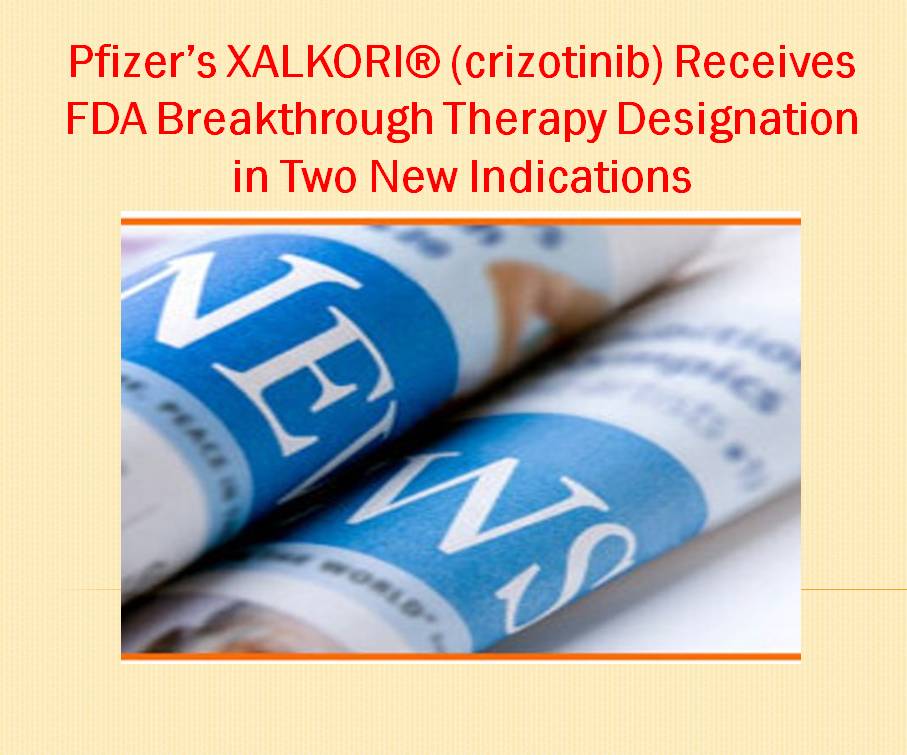
Pfizer Inc. (NYSE:PFE) announced today that the U.S. Food and Drug Administration (FDA) granted Breakthrough Therapy designation for XALKORI® (crizotinib) for the treatment of patients with metastatic non-small cell lung cancer (NSCLC) with MET exon 14 alterations with disease progression on or after platinum-based chemotherapy. The FDA also granted Breakthrough Therapy designation for XALKORI for the treatment of patients with relapsed or refractory systemic anaplastic large cell lymphoma (ALCL) that is anaplastic lymphoma kinase (ALK)-positive.
MET is a transmembrane tyrosine receptor kinase which is expressed in several types of cells. In patients with NSCLC, MET exon 14 alterations occur in approximately three percent of NSCLC tumors.1 Anaplastic large cell lymphoma is a rare type of non-Hodgkin lymphoma, divided into ALK-positive or ALK-negative disease.2,3 Despite the activity of chemotherapy, many patients with ALCL relapse or require alternative treatment approaches.4
“Biomarker-driven therapies have changed the way we treat cancer, helping to ensure that patients receive the right medicine for their disease,” said Mace Rothenberg, M.D., chief development officer, Oncology, Pfizer Global Product Development. “These Breakthrough Therapy designations for XALKORI exemplify our commitment to precision medicine development and delivering medicines that have the potential to transform the lives of patients whose cancers carry these genomic alterations.”
XALKORI is currently approved in the U.S. for the treatment of patients with metastatic NSCLC whose tumors are ALK-positive or ROS1-positive as detected by an FDA-approved test. XALKORI became a first-line standard of care for ALK-positive metastatic NSCLC in its first approved indication and has proven to be a practice-changing treatment for patients with ALK-positive and ROS1-positive NSCLC, globally. It is the only FDA-approved treatment indicated for both ALK-positive and ROS1-positive metastatic NSCLC. If approved in patients with metastatic NSCLC with MET exon 14 alterations, XALKORI will be the only TKI with demonstrated efficacy in three separate biomarker-driven indications in NSCLC.
The Breakthrough Therapy designation for patients with metastatic NSCLC with MET exon 14 alterations was supported by results from an expansion cohort of the Phase 1 PROFILE 1001 study, in which XALKORI showed antitumor activity.5
The designation for patients with relapsed or refractory systemic ALCL that is ALK-positive was supported by the results from Study ADVL0912 (NCT00939770) and Study A8081013 (NCT01121588). Study ADVL0912 is a Phase 1/2 study conducted by the Children’s Oncology Group evaluating the maximum dose that is safe and tolerable, and assessing preliminary clinical activity in pediatric patients with relapsed or refractory solid tumors and ALCL. Study A8081013 evaluated XALKORI in pediatric and adult patients with advanced malignancies known to be ALK-positive other than NSCLC and included patients with relapsed/refractory ALCL. These two studies showed compelling antitumor activity in pediatric and adult patients who received XALKORI.6,7
Please visit clinicaltrials.gov for more information on these studies.
The FDA’s Breakthrough Therapy designation is intended to expedite the development and review of a medicine if it is intended to treat a serious or life-threatening disease and preliminary clinical evidence indicates that the drug may demonstrate substantial improvement over existing therapies. The Breakthrough Therapy designation is distinct from the FDA’s other mechanisms to expedite drug development and review.8
About MET Alterations in Non-Small Cell Lung Cancer
Lung cancer is the leading cause of cancer deaths worldwide.9 NSCLC accounts for about 85 percent of lung cancer cases and remains difficult to treat, particularly in the metastatic setting.10 Approximately 75 percent of NSCLC patients are diagnosed late with metastatic or advanced disease where the five-year survival rate is only five percent.11,12
MET is a transmembrane tyrosine receptor kinase which is expressed in several types of cells. In patients with NSCLC, MET exon 14 alterations occur in approximately three percent of NSCLC tumors.